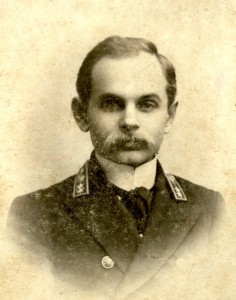| Edit | Map | Home | New Post | New Gallery |
Support
|
 | |
Kyrylo Hryhorovych Stetsenko is an outstanding Ukrainian composer of the late 19th and early 20th centuries.
A talented choir conductor, pedagogue, folklorist, music and public activist, he has steadily and consistently developed the traditions of Ukrainian classical music culture, laid down by his outstanding teacher Mykola Lysenko, throughout his creative career. A talented choir conductor, pedagogue, folklorist, music and public activist, he has steadily and consistently developed the traditions of Ukrainian classical music culture, laid down by his outstanding teacher Mykola Lysenko, throughout his creative career.
Kyrylo Hryhorovych Stetsenko was born on May 12 (May 24 according to the new style) in 1882 in the village of flowers
of the Kaniv district of the Kyiv province (now the Korsun-Shevchenkiv district of the Cherkasy region) in the poor, large family of a self-taught village painter. His father Hryhoriy Mykhailovych was a gifted person: he painted village churches, painted icons, portraits of wealthy customers, knew how to play the violin a little and, like his wife - Maria Ivanovna, was fond of music and singing It is not surprising that in such a family, Kirill's interest in music and drawing awakened in his early childhood.
His first teacher was the village dyak Platon Starzhevsky, who, noticing his musical talent and good
and the boy's voice, took him to the choir and introduced him to musical literacy.
However, the Stetsenko family hoped that Kyrylo would inherit his father's profession, because in addition to a good voice and ear for music, he was also artistically gifted and also drew well.
At the age of ten, thanks to the money earned by his older sister in hiring, the boy entered the famous Kyiv Art School of Mykola Murashka in the city of Kyiv. His uncle, Danylo Goryanskyi, a graduate of the Kyiv Theological Academy, where he lived, also enrolled him in the Bursa (theological school) at St. Sophia Cathedral.
Kyrylo almost immediately became the best chorister in Bursa, and later became the leader of the choir.
During these years, Stetsenko was finally defined with his artistic preferences. The love of music wins.
After graduating from school in 1897, Stetsenko entered the Kyiv Seminary - the lower level of the Kyiv Academy.
Here Stetsenko sings in the seminary choir, working as an assistant to the regent of the Michael Monastery, Ivan Apollonov (1898), in his free time from studies. At the age of 13, having mastered the harmonium and the piano, Kyrylo wrote his first piece for the choir - "Blessing the Lord always"
While in the theological school and seminary, Stetsenko is actively engaged in conducting and performing. Long-term practical work with choirs hones his choral mastery.
The high level of the seminar choir led by Stetsenko is evidenced by its public performances at the Lukyaniv People's House in Kyiv. The Kyiv press of that time wrote about it.
In 1899, a significant meeting for Stetsenko with Mykola Lysenko took place. Together with other seminarians, Stetsenko participated in Lysenko's choral travels around Ukraine. In one of them (1901), he acted as an assistant conductor. The teacher appreciated the talent of his student and proclaimed: "This is who will replace me after my death."
It is not surprising that his first choral works "Burlaka" and "Mohyla", written in 1902, were strongly influenced by Lysenko's work.
In the same year, 1902, Stetsenko was appointed conductor of the seminary choir. At that time it was one of the best chapels in Kyiv.
In 1903, Stetsenko graduated from the seminary and in 1904 entered the music school at the Kyiv branch of the Russian Musical Society (now the Kyiv Institute of Music named after R.M. Glyer) in the class of teacher Yevhen Ryb.
With the opening of the Music and Drama School, Lysenko transferred there to the theory and composition class of Hryhori Lyubomyrskyi. In order to support herself financially, Stetsenko teaches singing at the Kyiv-Podilskyi Girls' Gymnasium and the Kyiv Church-Teaching Seminary.
Important events in the young man's personal life occur at this time. In 1904, he met a beautiful girl - Yevgenia Frankivska. And in 1905, he got married. For the marriage ceremony in the church, Kirill wrote the choral service (church service) "Wedding".
In the early period of his work (1902-1904), the composer wrote vocal music - choruses, romances, and began work on the opera "Polonyanka". Among these works, the choral poem "Early in the Morning Recruits", the romance "Swim, Swim, Swan" and several numbers from the unfinished opera "Polonyanka" (libretto by Yevgeny Krotevich) stand out for their truthfulness and deep national character, in particular, the wonderful duma "Kryache voron" and poetic freckle for women's choir "Rose, bloom".
Already in these works, the serious work of the young composer on folklore, his ability to rethink folk song material and give it individual features are noticeable. There is also a departure from romantic images inspired by Boris Grinchenko and Yevhen Krotevich and the appearance of realistic works related to the poetry of Taras Shevchenko.
The stormy revolutionary events of 1905 affected all of Stetsenko's work. |
Автор: Sonya Версия: 1 Язык: Английский Просмотров: 0
|
Короткая ссылка: https://www.sponsorschoose.org/a210
Короткая ссылка на эту версию: https://www.sponsorschoose.org/n237
Автор - Sonya дата: 2023-06-05 06:47:52
Последнее изменение - Sonya дата: 2023-06-06 17:53:39
|